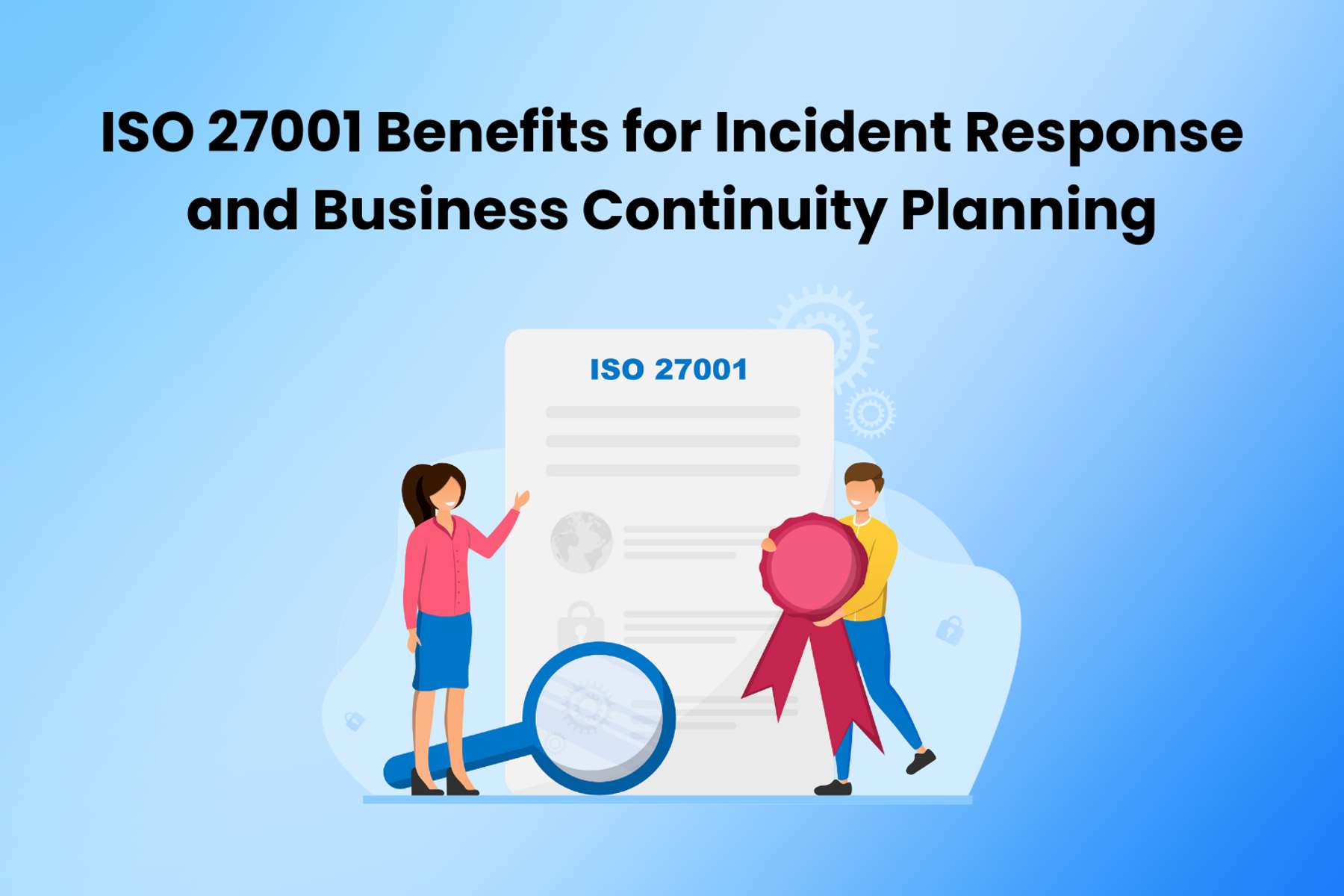ISO 27001 Benefits for Incident Response and Business Continuity Planning
Organisations in the information security space are constantly under pressure to protect their resources from possible attacks. The ISO 27001 standard is one efficient tool companies use to improve their security posture.
It strengthens incident response and business continuity planning and offers a robust framework for information security management. Professionals who want to learn more about the framework frequently enrol in ISO 27001 Training.

In this blog, we will look at the Benefits of ISO 27001 for incident response and business continuity planning.
Table of Contents
Table of Contents
- What is ISO 27001?
- Importance of ISO 27001 Training
- Benefits of ISO 27001 for Incident Response
- Proactive Incident Identification
- Streamlined Incident Response Processes
- Continuous Improvement through Incident Analysis
- Heightened Employee Awareness and Involvement
- Benefits of ISO 27001 for Business Continuity Planning
- Comprehensive Risk Management
- Enhanced Resilience in the Face of Disruptions
- Regulatory Compliance and Stakeholder Confidence
- Efficient Resource Utilisation
- A Holistic Approach for Integrating ISO 27001
- Conclusion
What is ISO 27001?
Let’s understand ISO 27001 before delving into how it helps with incident response and business continuity planning. This internationally recognised standard is known by many names. ISO 27001 is a methodical technique that guarantees data availability, confidentiality, and integrity while managing critical enterprise information. It includes a risk-based methodology that enables businesses to efficiently recognise, evaluate, and reduce information security risks.
Importance of ISO 27001 Training
To fully reap the benefits of ISO 27001, a knowledgeable and skilled workforce is necessary. Employees who receive appropriate ISO 27001 training are prepared with the knowledge and abilities needed to establish and maintain an efficient information security management system (ISMS). In addition to promoting awareness, this training allows people at every level of the company to improve the organisation’s overall security posture.
Benefits of ISO 27001 for Incident Response
Proactive Incident Identification
ISO 27001 standards encourage a proactive approach to incident identification. Organisations can prevent incidents by identifying potential vulnerabilities and threats early on by implementing a thorough risk assessment strategy. This proactive approach minimises the impact on operations and data integrity by enabling prompt action.
Streamlined Incident Response Processes
Creating incident response processes is a crucial component of ISO 27001 certification. These procedures specify what needs to be done during a security crisis, guaranteeing a prompt and well-coordinated reaction. This degree of readiness boosts the organisation’s overall resilience by lowering the chance of additional harm and reducing downtime.
Continuous Improvement through Incident Analysis
ISO 27001 strongly emphasises the value of incident learning. An essential component of the standard is post-incident analysis, which helps firms find the sources of problems and take corrective action. This cycle of continuous development improves the organisation’s capacity to change and adapt in the face of new threats.
Heightened Employee Awareness and Involvement
Thanks to ISO 27001, employees are encouraged to adopt a security-aware mindset. Regarding incident response, employees become the first line of defence through training and consistent communication. Their increased knowledge allows them to quickly identify and report possible security incidents, strengthening and improving the incident response procedure.
Benefits of ISO 27001 for Business Continuity Planning
Comprehensive Risk Management
Risk management and business continuity planning are closely related, and ISO 27001 provides a thorough foundation for both. By methodically identifying and evaluating risks, organisations may create effective business continuity plans that handle possible disruptions and guarantee the continuation of vital operations.
Enhanced Resilience in the Face of Disruptions
An organisation’s culture of resilience is ingrained by ISO 27001. By coordinating business continuity planning with information security management, the standard guarantees that the organisation is well-prepared to withstand and recover from interruptions, whether cyber-attacks, natural disasters, or other unanticipated events.
Regulatory Compliance and Stakeholder Confidence
Adherence to ISO 27001 showcases a dedication to safeguarding confidential information and improves conformity with regulations. This is especially crucial for sectors of the economy where privacy and data protection laws are strict. Additionally, stakeholders—such as clients and partners—become more confident in the company’s capacity to protect their interests, which promotes credibility and trust.
Efficient Resource Utilisation
ISO 27001 enables business continuity planning to make the most use of its resources. Organisations can more effectively allocate resources and identify essential processes using a structured risk assessment approach. This guarantees that critical functions are prioritised during disruptions, reducing the effect on overall operations and preserving essential services.
A Holistic Approach for Integrating ISO 27001
Organisations must take a comprehensive approach to fully benefit from ISO 27001 for incident response and business continuity planning. When ISO 27001 processes are integrated with other business operations, information security is embedded in the company culture. This integration increases the organisation’s overall resilience and improves the efficacy of incident response and business continuity planning.
Also Read: Effective Way to Optimize the Content for Marketing
Conclusion
To sum up, the advantages of ISO 27001 go well beyond information security management. Through the implementation of comprehensive incident response and business continuity planning, firms can confidently negotiate the intricacies of the current threat landscape.
Putting money into ISO 27001 implementation and training is an investment in the organisation’s long-term security and viability.
Adopting the standard is a strategic choice to strengthen the foundations of information security and ensure a robust and secure future, not just a way to check a box for compliance.